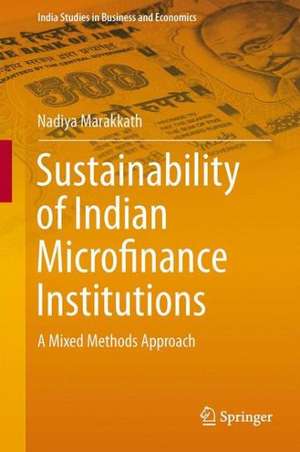Sustainability of Indian Microfinance Institutions: A Mixed Methods Approach: India Studies in Business and Economics
Autor Nadiya Marakkathen Limba Engleză Hardback – 6 noi 2013
| Toate formatele și edițiile | Preț | Express |
|---|---|---|
| Paperback (1) | 381.81 lei 6-8 săpt. | |
| Springer India – 23 aug 2016 | 381.81 lei 6-8 săpt. | |
| Hardback (1) | 388.90 lei 6-8 săpt. | |
| Springer India – 6 noi 2013 | 388.90 lei 6-8 săpt. |
Din seria India Studies in Business and Economics
- 18%
 Preț: 897.65 lei
Preț: 897.65 lei -
 Preț: 361.78 lei
Preț: 361.78 lei - 18%
 Preț: 1006.24 lei
Preț: 1006.24 lei - 18%
 Preț: 952.89 lei
Preț: 952.89 lei - 20%
 Preț: 883.22 lei
Preț: 883.22 lei -
 Preț: 186.41 lei
Preț: 186.41 lei - 15%
 Preț: 636.94 lei
Preț: 636.94 lei - 15%
 Preț: 647.27 lei
Preț: 647.27 lei - 15%
 Preț: 646.30 lei
Preț: 646.30 lei -
 Preț: 409.89 lei
Preț: 409.89 lei -
 Preț: 372.98 lei
Preț: 372.98 lei -
 Preț: 389.88 lei
Preț: 389.88 lei - 18%
 Preț: 894.03 lei
Preț: 894.03 lei - 15%
 Preț: 644.30 lei
Preț: 644.30 lei - 15%
 Preț: 528.30 lei
Preț: 528.30 lei - 15%
 Preț: 643.65 lei
Preț: 643.65 lei - 15%
 Preț: 644.82 lei
Preț: 644.82 lei - 15%
 Preț: 660.37 lei
Preț: 660.37 lei -
 Preț: 386.00 lei
Preț: 386.00 lei - 20%
 Preț: 559.76 lei
Preț: 559.76 lei - 15%
 Preț: 643.99 lei
Preț: 643.99 lei -
 Preț: 386.68 lei
Preț: 386.68 lei -
 Preț: 390.08 lei
Preț: 390.08 lei -
 Preț: 365.76 lei
Preț: 365.76 lei -
 Preț: 393.52 lei
Preț: 393.52 lei - 15%
 Preț: 656.74 lei
Preț: 656.74 lei - 24%
 Preț: 699.24 lei
Preț: 699.24 lei -
 Preț: 369.80 lei
Preț: 369.80 lei - 15%
 Preț: 642.68 lei
Preț: 642.68 lei - 15%
 Preț: 649.87 lei
Preț: 649.87 lei - 15%
 Preț: 645.28 lei
Preț: 645.28 lei -
 Preț: 372.66 lei
Preț: 372.66 lei -
 Preț: 389.17 lei
Preț: 389.17 lei - 20%
 Preț: 569.00 lei
Preț: 569.00 lei - 15%
 Preț: 641.85 lei
Preț: 641.85 lei -
 Preț: 392.97 lei
Preț: 392.97 lei - 15%
 Preț: 643.84 lei
Preț: 643.84 lei - 24%
 Preț: 656.32 lei
Preț: 656.32 lei - 15%
 Preț: 651.34 lei
Preț: 651.34 lei - 15%
 Preț: 641.53 lei
Preț: 641.53 lei - 15%
 Preț: 640.37 lei
Preț: 640.37 lei - 20%
 Preț: 569.86 lei
Preț: 569.86 lei
Preț: 388.90 lei
Nou
Puncte Express: 583
Preț estimativ în valută:
74.42€ • 80.81$ • 62.52£
74.42€ • 80.81$ • 62.52£
Carte tipărită la comandă
Livrare economică 22 aprilie-06 mai
Preluare comenzi: 021 569.72.76
Specificații
ISBN-13: 9788132216285
ISBN-10: 8132216288
Pagini: 184
Ilustrații: XVI, 166 p. 33 illus., 3 illus. in color.
Dimensiuni: 155 x 235 x 16 mm
Greutate: 0.44 kg
Ediția:2014
Editura: Springer India
Colecția Springer
Seria India Studies in Business and Economics
Locul publicării:New Delhi, India
ISBN-10: 8132216288
Pagini: 184
Ilustrații: XVI, 166 p. 33 illus., 3 illus. in color.
Dimensiuni: 155 x 235 x 16 mm
Greutate: 0.44 kg
Ediția:2014
Editura: Springer India
Colecția Springer
Seria India Studies in Business and Economics
Locul publicării:New Delhi, India
Public țintă
ResearchCuprins
1: Introduction.- 2: Literature Review.- 3: Research Objectives and Design.- 4: Quantitative Phase: Identification of Factors Affecting and Discriminating Sustainability.- 5: Intermediate Participant Selection Phase: Assessment of Efficiency and Sustainability.- 6: Qualitative Phase: Management of Factors Affecting and Discriminating Sustainability.- 7: Dangers in Mismanaging the Factors Affecting and Discriminating Sustainability: An Exploration into Indian Microfinance Crisis.- 8: Summary of Findings, Implications and Conclusion.- Appendices.- A1: Operational Definition and Distinction between Operational Self-Sustainability Ratio, Financial Self-Sustainability Ratio and Subsidy Dependence Index.- A2: Charnes, Cooper & Rhodes Model and Banker, Charnes & Cooper Model Formulation.- A3: Interview Guide.- A4: Summary of the Qualitative Data Collected During the Interviews.- A5: Group Formation Process in Fourteen Days.
Notă biografică
Nadiya Marakkath is an Assistant Professor at the Centre for Social Entrepreneurship, School of Management and Labour Studies, Tata Institute of Social Sciences (TISS), Mumbai. She teaches academic courses in finance, microfinance and research methods to M. A. social entrepreneurship students at TISS. She enjoys nurturing the dreams of young social entrepreneurs and therefore involves herself in incubation and funding initiatives for social entrepreneurship students at TISS. She received her PhD in financial management, with specialization in microfinance and has doctoral research experience in finance at the National Institute of Technology, Calicut and the Indian Institute of Technology Madras, Chennai, India. Finance systems and their regulatory aspects, microfinance sustainability management, legitimacy and sustainability challenges in social entrepreneurship, entry and exit issues of social entrepreneurs, performance management for social ventures and design of hybrid ventures are her areas of research interest.
Textul de pe ultima copertă
For any practicing social entrepreneur, building a sustainable organization that stands the test of time remains a formidable challenge. Using a mixed-methods research approach, this book investigates, specifically in the Indian context, the concept of sustainability in one of the most celebrated form of social enterprises of our times — Microfinance Institutions (MFIs). What are the determinants and discriminants for the sustainability of Indian MFIs? How are these factors being managed by operationally efficient Indian MFIs that remained sustainable at reasonable interest rates, even before the onset of the crisis and imposition of ceilings in Indian microfinance markets? What does the Indian microfinance crisis teach us about sustainability management and mismanagement? The discussion centred on these questions, depicts sustainability to be a strategic issue that needs managerial attention and not left to serendipity.
At a time when the industry is recovering from the adverse effects of a crisis and questions the fixed interest rate imposed by regulators, the findings mentioned in the book revive the lost hope for the Indian microfinance industry. By deciphering the strategies used by efficient and sustainable MFIs and discussing the lessons that the crisis has imparted to the Indian microfinance markets, this book enables Indian MFIs to march towards efficient and sustainable operations, without losing focus on their clients.
At a time when the industry is recovering from the adverse effects of a crisis and questions the fixed interest rate imposed by regulators, the findings mentioned in the book revive the lost hope for the Indian microfinance industry. By deciphering the strategies used by efficient and sustainable MFIs and discussing the lessons that the crisis has imparted to the Indian microfinance markets, this book enables Indian MFIs to march towards efficient and sustainable operations, without losing focus on their clients.
Caracteristici
Documents the understanding of the sustainability of the Microfinance Institutions (MFIs) gained through a mixed-methods research investigation Answers pertinent questions to enable Indian MFIs to march towards efficient and sustainable operations without losing focus on their clients Contains findings to revive lost hope for the Indian microfinance industry at a time of crisis













